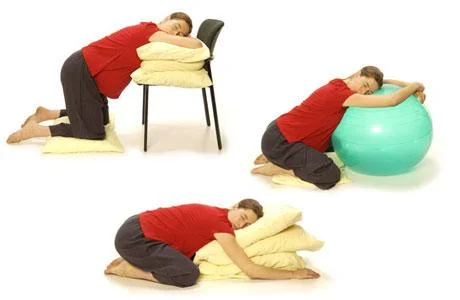First off, Happy Mother’s Day to all moms! Whether it’s your first born, step child, or30 year old kudos to you for all your hard work, love and support!
This weekend seems like a great time to bring up the benefits of pelvic floor physical therapy for soon to be moms! Last weekend I went to a "Care of the Pregnant Patient" course and I am even more in awe that the female body can LITERALLY grow another human. I mean seriously, if you have had a baby, you should high five yourself right now. Go ahead, I’ll wait.
Ok great, back to the post. Pelvic floor physical therapists can do so much more for you than just treat you once you had a problem. We can be especially helpful to pregnant women and new moms! By the way - did you know that in France, every new mom gets to work with a women's health therapist as part of standard care?! They are lightyears ahead of us in standard care which is why it's even more important that you learn what you could benefit from! So here are the 4 reasons pregnant women should see a pelvic floor PT!
#1 We can get your pelvic floor ready for birth
Did you know that in one study, only 30% of OB/GYNs could name the muscles of the pelvic floor? Yeesh! Now that's not to bash ob/gyns, they are great practitioners. But pelvic floor PTs spend more time learning about the function of the muscles, tendons, and ligaments and treatment options. Better than treating pelvic floor dysfunction, many of us would rather prevent it in the first place.
Birth is like a marathon not a sprint. You wouldn't show up on race day without ever training right? Well your pelvic floor muscles should be ready too. Healthy muscles need to be strong AND flexible. No where else does flexibility of your muscles matter more than during a vaginal delivery. The “push” of getting a baby out actually comes from your uterus, which causes the contractions you feel. When you have those contractions, you need to be able to relax your pelvic floor muscles. Women who are unable to relax or contract their pelvic floor muscles are more likely to tear during birth.
A pelvic floor therapist can make sure that a) you are able to contract/relax your muscles and b) you know which you are doing at any given time. Some women may actually be contracting when they think they are relaxing and vice versa.
#2 We can help you find your best birthing positions
Laying flat on your back with your legs way up in the air is not the ONLY position for you to give birth. Generally speaking, sidelying is the most protective position for the pelvic floor muscles, meaning you are the least likely to tear. Next is on your hands and knees. While it’s pretty easy to look up all these different positions, how do you know which one is the best for YOU?
A pelvic floor PT can use biofeedback to assess which positions are the best for you! Biofeedback relies on placement of external pads (typically 2 around your anus and 1 on your buttcheek) to detect muscle activity. The electrodes connect back to a unit which shows a reading of the muscle activity and gives us information about how well you contract and relax.
We actually did this on one another at the course I went to last weekend and it was by far the best lab! Everyone was so excited afterwards talking about which positions were best for them. And surprise surprise, all the results varied! Remember, not every position will work for every woman. Personally, I did the worst in sidelying and flat on my back. But I did great standing, squatting, and on my hands and knees.
Even women who want to have an epidural would benefit from one of these assessments. You can switch positions with the help or nurses/partner/doula and can use pillows, bolsters, and physioballs to support your body.
#3 We can help you with the low back pain, headaches, carpal tunnel syndrome, etc
Between 47-70% of women will develop low back pain during pregnancy. Another 27-67% of women will leak pee while pregnant. And over 50% of pregnant women report swelling of the leg, ankle, and foot and hip pain.
With such high numbers, it’d be ridiculous for you to simply “put up with it” while pregnant. Remember, “common” does not mean it’s okay. Getting low back pain? Tailbone pain? Get help! Your body is working hard to make room for the growth of baby inside you. Don't make things tougher for yourself by simply accepting pain as a given. You can see an outpatient orthopedic therapist for care of these symptoms or go to a pelvic floor therapist for treatment. Either way, I would recommend talking to your therapist if she or he has experience and further training in working with the pregnant population.
#4 We can help get you back to activity after baby (or help you start new ones!)
Okay so this is for after you have your baby... but it's still important to know! Most post-partum care is waiting to get the green light from your doctor to resume sex and activities. There is so much more to resuming life after pregnancy than just getting the go ahead from your doc.
Let's be blunt here: things aren’t the same. Whether it was a vaginal delivery or c-section, your body has gone through a lot. Even if you never had any pelvic floor problems before baby your abdominal, pelvic floor, and hip muscles are trying to figure out how to work in this new dynamic. If you had any type of tear or other injury during delivery, then you have an even greater need to work with a pelvic floor therapist
Approximately 66% of women will experience a separation of their abdominal connective tissue during their 3rd trimester of pregnancy, known as diastasis recti. And 53% will have this problem immediately after having the baby. (Check back next week for more info and how to assess if you have this condition!)
The pelvic floor and abdominal muscles together make up ½ of the core. If you have dysfunction and/or trauma to these areas then logically, trying to walk, run, lift, zumba, or dance is going to be pretty tough if ½ of your essential muscles aren’t doing their job quite right. You are going to need more than just time. Whether you were a “fit mommy” or want to start exercising for the first time, a pelvic floor PT can make sure that your body is ready for whatever you want to do.












